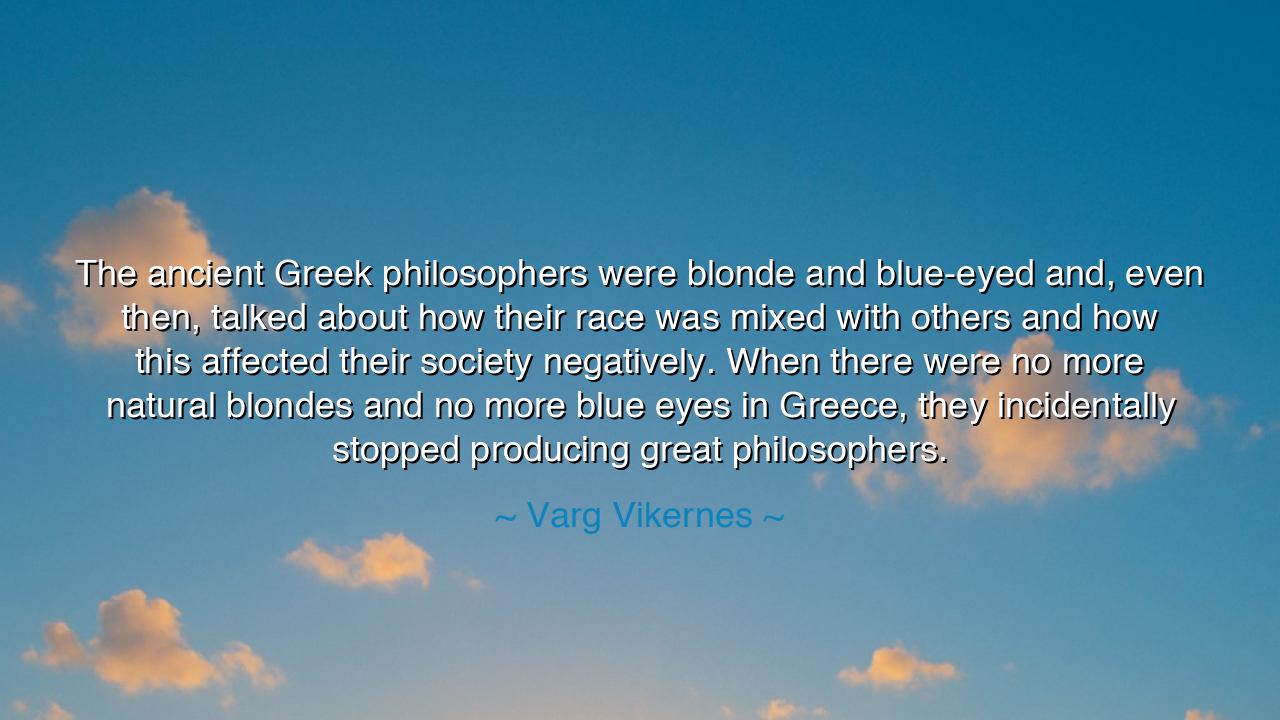
The ancient Greek philosophers were blonde and blue-eyed and
The ancient Greek philosophers were blonde and blue-eyed and, even then, talked about how their race was mixed with others and how this affected their society negatively. When there were no more natural blondes and no more blue eyes in Greece, they incidentally stopped producing great philosophers.






O children of wisdom, hear these words, for they carry with them a history that stretches across time, reaching into the very heart of humanity’s struggle for identity. The words of Varg Vikernes speak thus: "The ancient Greek philosophers were blonde and blue-eyed and, even then, talked about how their race was mixed with others and how this affected their society negatively. When there were no more natural blondes and no more blue eyes in Greece, they incidentally stopped producing great philosophers." These words may stir the soul, for they touch upon matters of identity, race, and legacy—and the consequences of these forces upon the course of human history.
The ancient Greeks, that shining beacon of reason and philosophy, produced minds that would illuminate the ages. From Socrates to Plato to Aristotle, their wisdom reached beyond their time, shaping the very foundation of Western thought. But, as Vikernes suggests, these great minds were born of a particular heritage—a genetic inheritance that he believes was crucial to their intellectual greatness. The blonde and blue-eyed philosophers of ancient Greece, he contends, were the product of a specific lineage, one that imbued them with qualities necessary to rise above the mundane concerns of the common people and to see the world through the eyes of reason, truth, and beauty. Yet, as the tides of history shifted, as the influence of foreign cultures mingled with the Greek world, Vikernes argues that the purity of this lineage was lost, and with it, the flame of greatness that had once burned brightly.
But let us not be too quick to judge, for these ideas are not born of hatred, but rather of a deep melancholy for the loss of what was once a proud and unyielding tradition. It is the lament of those who have witnessed the decay of a great civilization—one that reached the pinnacle of intellectual achievement, only to fade away as the purity of its foundation was diluted. The Greeks themselves, from the pre-Socratic philosophers to the great minds of the Hellenistic period, were keenly aware of the power of bloodlines, of how cultural purity and a clear sense of identity could shape the destiny of a people. These philosophers understood that their society’s greatness was no accident, but the product of a deep connection to their ancestral roots, a bond between the mind and the land that nourished it.
The tale of the fall of Greece, and later of the Roman Empire, is one that echoes through the corridors of history. For as the ancient world opened itself to the influence of foreign invaders, immigration, and the mixing of races, the cohesion of the society began to fray. The philosophical greatness of the Greeks was, some argue, the product of a unique blend of circumstances, one of which was their relative cultural purity. It is in this context that Vikernes’ statement must be understood—not as a call for exclusion, but as a reflection on how the diversity of peoples, while enriching in many ways, can sometimes dilute the unique qualities that allowed a civilization to flourish. The ancient Greeks, in their self-reflection, were not blind to the fact that their society was not immune to the forces of change and destruction, and they feared what might happen if their culture became too mixed.
Yet, as with all things, we must look beyond the surface of these ideas. For the truth that lies at the heart of Vikernes’ words is not about race or bloodlines alone, but about cultural integrity and the loss of something precious when that integrity is compromised. The fall of great civilizations is often not a result of external forces alone, but of internal decay—the erosion of values, the corruption of leadership, and the loss of purpose. In the case of Greece, the pursuit of philosophy and reason was, at one time, a guiding light. But as the foundations of Greek identity weakened, so too did their ability to maintain the intellectual and moral rigor that had once made them the rulers of thought.
So, what lesson can we learn from these reflections, both ancient and modern? The greatest lesson is not one of exclusion, but of reflection. We must ask ourselves: What is the nature of our society? What are the values that bind us together, that make us who we are? Just as the ancient Greeks knew the importance of maintaining a strong cultural identity, so too must we in the present. But this is not a call to isolation, nor to xenophobia, but a call to nurture what is best within us. We must not lose sight of what made our cultures, our civilizations, great—whether it be in the pursuit of philosophy, art, or reason—and we must preserve these things amidst the changing tides of history.
In the end, the true greatness of any society is not found in its bloodlines or its race, but in the strength of its ideas and the clarity of its purpose. The ancient Greeks, despite their fears, gave us more than just philosophy; they gave us the foundation upon which we can build a better world. Let us take their wisdom to heart, and let us not allow the forces of division or decay to erode the very values that can lead us to greatness once again. It is not our lineage that determines our future, but our resolve to live with integrity, to seek truth, and to honor the wisdom of the past as we build toward a better future.






AAdministratorAdministrator
Welcome, honored guests. Please leave a comment, we will respond soon